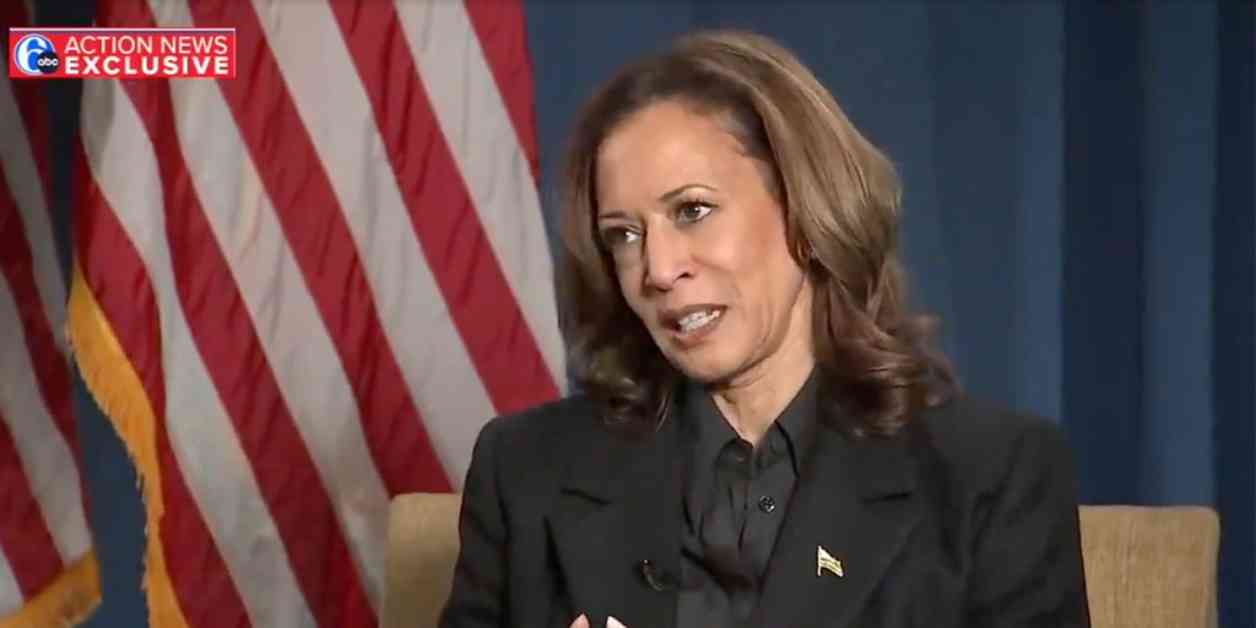Critics Slam Kamala Harris’ TV Interview for Bewildering Answers: ‘Talk is Cheap’
The backlash against Vice President Kamala Harris’ recent television interview continues to grow, with critics expressing frustration over her vague and evasive responses. During her first solo sit-down TV interview since becoming the Democratic presidential nominee, Harris faced criticism for not providing clear and specific answers to questions posed by interviewer Brian Taff of the Philadelphia ABC affiliate.
Harris’s Responses Draw Criticism
One of the key moments that drew criticism was when Taff asked Harris about her specific plans to bring down prices for Americans. In response, Harris began by sharing anecdotes from her upbringing as a middle-class child raised by a hardworking mother. While attempting to relate to the experiences of average Americans, Harris’s answer failed to provide concrete solutions to address the issue at hand.
Critics Take Aim at Harris’s Performance
Critics took to social media to express their dissatisfaction with Harris’s performance during the interview. Karoline Leavitt, former press secretary for Donald Trump, criticized Harris for her inability to articulate clear strategies to combat inflation. Similarly, California State Senate Minority Leader Brian Jones voiced concerns over Harris’s track record, suggesting that her leadership has contributed to rising costs and economic challenges.
Conservative podcaster Benny Johnson also joined the chorus of criticism, pointing out the lack of coherence in Harris’s responses. Johnson highlighted Harris’s vague statements about focusing on long-term goals without offering tangible solutions to immediate problems.
Harris’s Pattern of Non-Responsive Answers
Harris’s evasive responses during the television interview echoed her performance in previous debates and public appearances. During a presidential debate against former President Trump, Harris avoided directly answering a question about the economic well-being of Americans, instead emphasizing her plans for an “opportunity economy.” This pattern of deflecting direct inquiries has raised concerns among observers about Harris’s ability to address pressing issues effectively.
Harris’s Debate Performance Foreshadows Interview
While Harris received praise for her debate performance, her tendency to sidestep questions on economic matters raised red flags. Despite being asked whether Americans are better off now than they were four years ago, Harris reiterated familiar proposals without directly acknowledging the current economic challenges facing the nation. Former Hawaii Rep. Tulsi Gabbard criticized Harris for failing to acknowledge the negative impact of policies implemented by the Biden administration.
Disparity in Media Engagement
A notable point of contrast between the Democratic and Republican presidential tickets is the difference in media engagement. Harris and her running mate, Tim Walz, have participated in only 10 unscripted interviews, while their Republican counterparts, Trump and Sen. JD Vance, have engaged in at least 49 interviews. This gap in media exposure raises questions about the transparency and accessibility of the Democratic ticket to the public.
Calls for Accountability
Amidst growing scrutiny over Harris’s performance and communication strategy, voices from both sides of the political spectrum have called for accountability. New York Times columnist Brett Stephens criticized Harris’s recent interviews as lacking substance and clarity, highlighting the need for more direct and meaningful communication from the Vice President. Susan Page, USA Today’s Washington bureau chief, emphasized the importance of candidates answering tough questions to provide transparency and accountability to the American public.
The Need for Clear Communication
As the 2024 presidential election approaches, the ability of candidates to communicate effectively and address pressing issues will be crucial in shaping public opinion. Harris’s recent interview highlights the importance of clarity, specificity, and transparency in political discourse. Moving forward, voters will be looking for candidates who can offer concrete solutions and engage in meaningful dialogue on the challenges facing the nation.
Conclusion
In the wake of the criticism surrounding Kamala Harris’s recent television interview, the Vice President faces mounting pressure to communicate more effectively and address key issues directly. While her performance in debates and public appearances has drawn mixed reactions, Harris’s evasive responses and lack of specificity have raised concerns about her ability to lead effectively. As the campaign season progresses, the demand for clear communication and accountability from political leaders will only intensify, shaping the public’s perception of the candidates vying for the highest office in the land.




